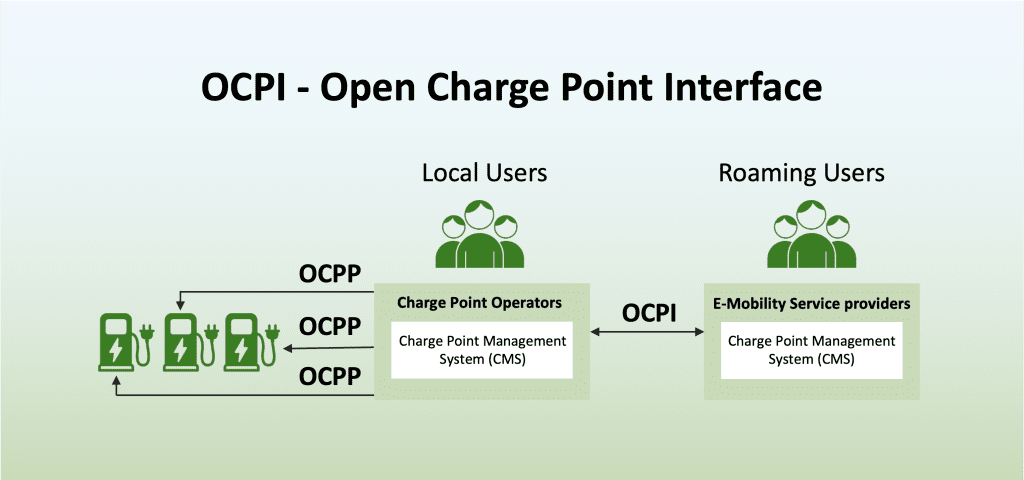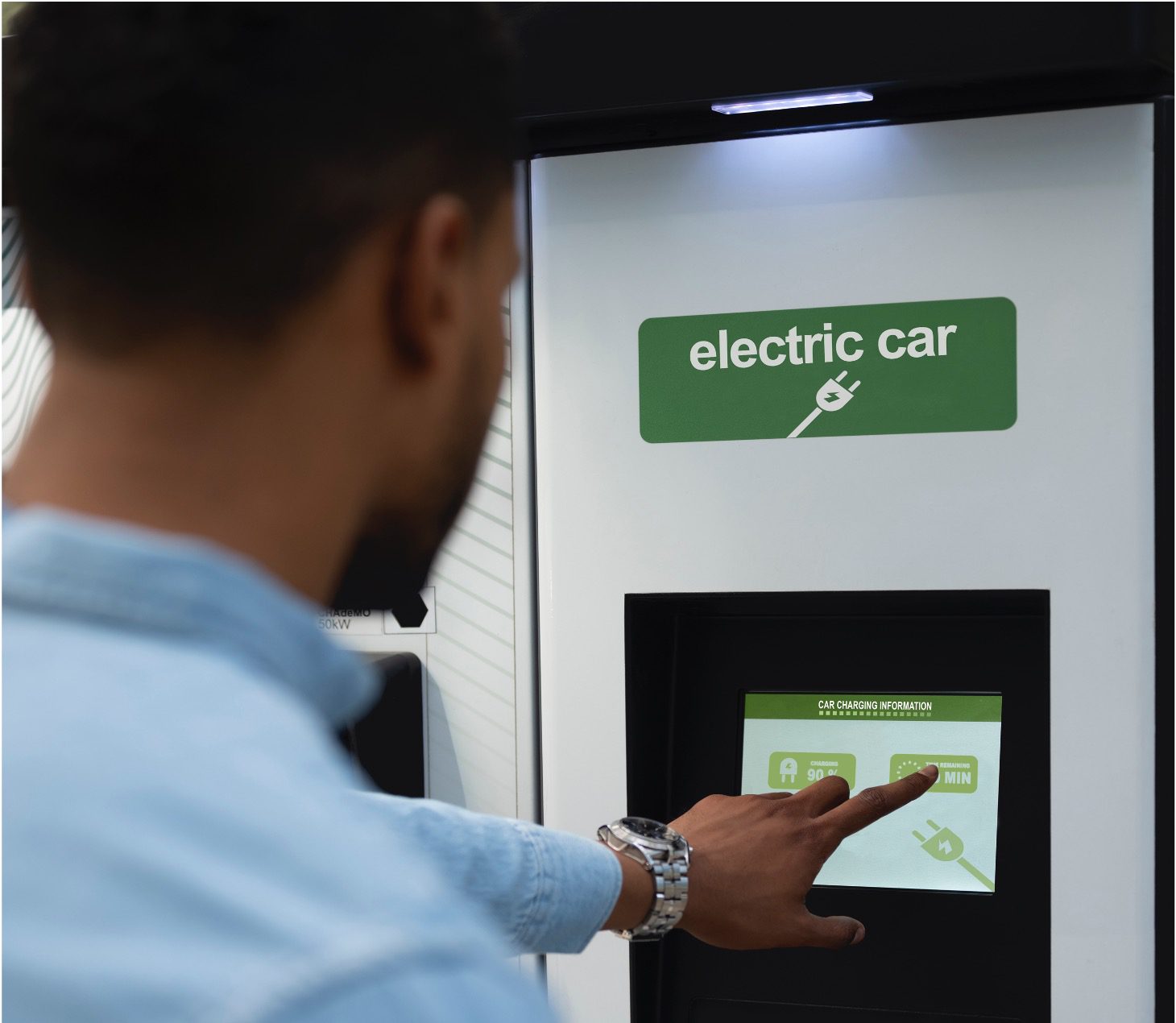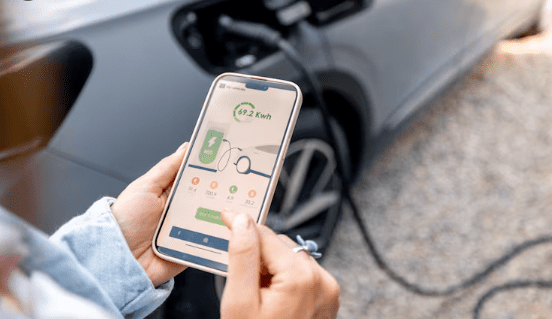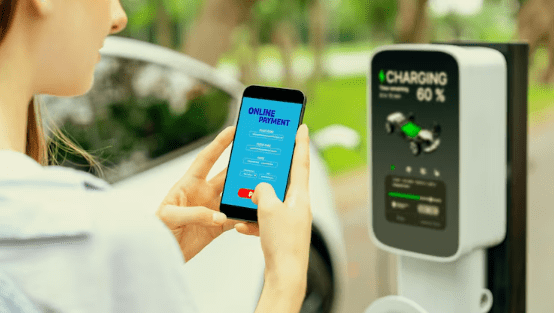As electric vehicles (EVs) become more widespread, the need for a seamless and interoperable charging network has never been more important. One of the key enablers of this is the Open Charge Point Interface (OCPI), an open protocol that allows different EV charging stations to communicate effectively, ensuring drivers can charge anywhere, anytime.
Let’s explore what OCPI is, why it’s used, its benefits, and how ElectreeFi plays a pivotal role in making EV charging more accessible.
Table of Contents
What is OCPI?
The Open Charge Point Interface (OCPI) is a system that helps different EV charging networks talk to each other. Think of it as a common language that allows various companies to share information easily. This means that if you have an electric vehicle (EV) and want to charge it, you can use one app or account to access multiple charging stations from different providers.
The Open Charge Point Interface (OCPI) is an open communication protocol designed to allow seamless data exchange between different EV charging stations, Charge Point Operators (CPOs) (companies or entities responsible for managing and maintaining EV charging stations), Charging Management System (CMSs) (software platforms that allow CPOs to manage the operations of their charging station), and E-Mobility Service Providers (EMSPs). It eliminates the need for multiple apps or subscriptions by enabling direct interoperability between systems, ensuring EV drivers can charge their vehicles across different networks without hassle.
Open communication protocol refers to the set of rules and standards that allow different software or systems to exchange information without any barriers. In the case of OCPI, it allows various EV charging companies to connect and share data smoothly, making it simpler for everyone involved.
What is the latest version of OCPI?
OCPI is an open-source protocol, meaning it is available to anyone without licensing fees. This allows companies in the EV ecosystem to easily adopt and integrate the standard.
The protocol is continuously updated, with new versions released to incorporate the latest features and improvements. As of now, the most widely used version is OCPI 2.2.1, which includes enhanced features like better support for smart charging and roaming between networks.

Benefits of OCPI
Interoperability:
OCPI ensures that charging stations from different operators work together, giving users access to multiple networks with a single subscription.
Real-Time Information:
OCPI provides real-time updates on charger availability, session progress, and pricing, improving user experience.
Cost Efficiency for Providers:
By streamlining billing and data sharing, CPOs can reduce operational costs while improving network efficiency.
Scalability:
The open protocol allows businesses to scale their charging networks more easily without being tied to a specific hardware provider.
Why is OCPI Used?
OCPI is essential for overcoming one of the biggest challenges in the EV industry—fragmented charging networks. Without a unified protocol, EV drivers face the inconvenience of registering with multiple providers and dealing with different billing systems. OCPI addresses these problems by creating a standardized framework, enabling users to roam freely across various networks, thereby promoting a more integrated and convenient charging experience.
OCPI vs OCPP: What’s the Difference?
While OCPP (Open Charge Point Protocol) and OCPI (Open Charge Point Interface) are both communication protocols used in the EV charging infrastructure, they serve different purposes. Let’s break down the core differences:
OCPP: Focuses on the communication between EV charging stations and central management systems. It ensures that the operator can monitor, control, and maintain charge points remotely.
OCPI: Primarily concerned with enabling interoperability between different EV charging networks. OCPI allows drivers to roam between various charging networks seamlessly, using just one account. It handles billing, authentication, and charging session details, enabling a smoother experience for the end-user.
Here’s a comparison chart for OCPI vs OCPP
Feature | OCPI (Open Charge Point Interface) | OCPP (Open Charge Point Protocol) |
Purpose | Facilitates interoperability between different EV charging networks (e.g., roaming, billing, and user authentication). | Focuses on communication between EV charging stations and central management systems (e.g., remote monitoring and control). |
Communication Focus | EV Roaming, charging session information, billing, and payments between different service providers (CPOs, EMSPs). | Charging station management, remote monitoring, and maintenance for Charge Point Operators (CPOs). |
Key Participants | Charge Point Operators (CPOs), E-Mobility Service Providers (EMSPs), and Charging Management Systems (CMSs). | Charge Point Operators (CPOs) and Charging Management Systems (CMSs). |
Primary Function | Enables EV drivers to use multiple charging networks with one account, allowing seamless EV Roaming. | Manages the operation of charging stations, ensuring real-time control and updates on charging status and maintenance. |
Scope | Interoperability between different charging networks, handling roaming, billing, and user authentication. | Internal station management, communication between charge points and central systems. |
Data Exchange | Handles real-time exchange of session details, pricing, and availability between different charging networks. | Controls charging sessions, collects data, and manages station maintenance from a central system. |
User Focus | Primarily benefits EV drivers by simplifying access to multiple networks and payment systems. | Primarily benefits Charge Point Operators (CPOs) for remote management and maintenance of charging stations. |
Protocol Versions | OCPI 2.2.1 is the latest widely adopted version, offering enhanced roaming and smart charging support. | OCPP 2.0.1 is the latest version, with features like security management and smart charging. |
Open Source | Yes, OCPI is open-source and free to adopt, allowing wide accessibility and implementation. | Yes, OCPP is open-source and widely adopted in the industry. |
Focus on Billing & Payments | Yes, facilitates billing and EV Charging Station Payment Solutions across different networks. | No, primarily focuses on technical management, not billing. |
Use of Single App/Subscription | Yes, allows users to access various charging networks with a single subscription or app. | No, focuses on the internal operation of charging stations. |
Roaming Capabilities | Yes, ensures EV Roaming across multiple networks, allowing users to charge their EVs anywhere. | No, OCPP does not handle roaming; it is more technical and operational in focus. |
Scalability | Highly scalable due to the open protocol, allowing easy integration with new networks and services. | Scalable for station operators but primarily focused on infrastructure rather than user experience. |
Why is OCPI Important?
OCPI simplifies the process for EV drivers, allowing them to use various charging stations from different networks without the need for multiple accounts. For CPOs and EMSPs, it enables a broader reach by ensuring their services are accessible to more users. The protocol promotes interoperability, which is key for a seamless EV charging experience across different regions and providers.
ElectreeFi’s Role in OCPI:
ElectreeFi is a leading solution provider that leverages the OCPI protocol to deliver a seamless and interoperable EV charging experience. Through ElectreeFi, EV drivers can access a wide network of charging points without switching between different apps or services.
ElectreeFi’s platform simplifies operations for CPOs by providing real-time data and ensuring that EV charging infrastructure remains scalable and future-proof.
By embracing OCPI, ElectreeFi enhances the usability and accessibility of EV charging, making it easier for drivers and operators to benefit from a growing ecosystem.
Final thoughts
The OCPI protocol is revolutionizing the EV industry by fostering interoperability and simplifying the charging experience for both drivers and operators. Companies like ElectreeFi are leveraging this open standard to create more user-friendly and accessible charging networks, helping to drive the adoption of electric vehicles globally. As the EV market continues to expand, OCPI will remain a critical factor in ensuring a smooth and integrated charging experience for all.
Looking to enhance your EV charging operations with OCPI?
All of our EV charging stations are fully OCPP-compliant, ensuring seamless integration and communication across your charging network. Share your specific needs with us, and we’ll customize the ideal charging solution tailored just for you, including EV Charging Station Installation, EV Charging Station Payment Solutions, and more. ElectreeFi is not just improving EV charging—it’s shaping the future of sustainable mobility. Contact us today!





